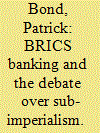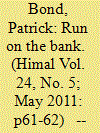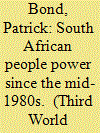|
|
|
Sort Order |
|
|
|
Items / Page
|
|
|
|
|
|
|
| Srl | Item |
| 1 |
ID:
144254


|
|
|
|
|
| Summary/Abstract |
Funded at $100 billion each, the BRICS Contingent Reserve Arrangement (CRA) and New Development Bank (NDB) represent ‘sub-imperial’ finance, insofar as, by all indications, they fit into – instead of providing alternatives to – the prevailing world systems of sovereign debt and project credits. Balance of payments constraints for BRICS members will not be relieved by the CRA, which requires an IMF intervention after just 30% of the quota is borrowed. In this context the NDB would appear close to the Bretton Woods Institution model, promoting frenetic extractivist calculations based on US dollar financing and hence more pressure to export.
|
|
|
|
|
|
|
|
|
|
|
|
|
|
|
|
| 2 |
ID:
121777


|
|
|
|
|
| Publication |
2013.
|
| Summary/Abstract |
The power, vulnerability and destructiveness of financial markets are out of control in South Africa, now among the most unequal, economically volatile and protest-intensive countries worldwide. While debt made itself felt in many sites, of interest in both criticising and promoting solutions is the 'scale jumping' required from South Africa's national insertion into the world financial system, entailing the Reserve Bank setting very high interest rates, in turn leading to unpayable levels of consumer debt, and at a time when microfinance is suddenly discredited as a development strategy. Macro- and micro-financial problems fused in the course of the Marikana Massacre of August 2012, reflecting the local and global powers of the Moody's rating agency and 'mashonisa' loan sharks. The over-indebted Marikana mineworkers, who led a strike which catalysed many wildcat strikes elsewhere, confronted the local crisis by displacing it into the national economy. This only heightened the contradictions that Moody's punished with its September 2012 credit-rating downgrade. Without a genuine 'debt relief' solution at both scales, society will continue to unravel, as financialisation reaches its limits within one of the world's most extreme cases of uneven and combined development.
|
|
|
|
|
|
|
|
|
|
|
|
|
|
|
|
| 3 |
ID:
069176


|
|
|
| 4 |
ID:
103878


|
|
|
| 5 |
ID:
112493


|
|
|
|
|
| Publication |
2012.
|
| Summary/Abstract |
The advent and growth of a community-based democracy movement in South Africa in the late 1970s was decisive in destabilising the apartheid regime and paving the way to democracy. But in the quarter century since then progressive civil society has ebbed and flowed, reaching a peak in the early 1990s as an anti-apartheid force, retreating into a 'honeymoon period' with Nelson Mandela's anc government during the late 1990s, and emerging as 'new social movements' around 1999. These latter included the Treatment Action Campaign, which won enormous victories in cheapening aids medicines, and urban community movements which advocated improved water/sanitation, electricity and housing. Within five years these movements had either won or begun to fade; more recent people power has taken the form of disruptive - but ultimately disorganized - township insurgencies. In cases where the popular movements allied with the Congress of SA Trade Unions, they made progress, but the latter's political allegiances to the anc and the unions' ability to replace the anc president in 2007 meant continuing gridlock for social and economic change, as society remained under neoliberal public policy domination.
|
|
|
|
|
|
|
|
|
|
|
|
|
|
|
|
| 6 |
ID:
121758


|
|
|
|
|
| Publication |
2013.
|
| Summary/Abstract |
South Africa's role in global economy and geopolitics was, during the apartheid era, explicitly sub-imperialist, as the West's 'deputy sheriff' in a tough neighbourhood But, with democracy in 1994, there arose a debate surrounding the difference between the liberation government's (leftist) foreign policy rhetoric and its practice. Defining the sub-imperial standpoint at this stage is important in because of the extreme economic, social and environmental contradictions that have worsened within South Africa, for which anti-imperialist rhetoric is sometimes a salve. However, the explicit strategies for global engagement chosen by Pretoria, including joining the Brazil-Russia-India-China (bric) alliance in early 2012, have not proven effective in reforming world power relations. The degree to which brics has recently accommodated imperialism-especially in matters related to economic and ecological crises-suggests that critics should more forcefully confront the general problem of sub-imperial re-legitimation of neoliberalism. That problem requires a theory of sub-imperialism sufficiently robust to cut through the domestic and foreign policy claims made by the brics regimes, of which South Africa's are among the most compelling given the ruling elite's ubiquitous 'talk left, walk right' tendency and the extremely high levels of social struggles against injustice that result.
|
|
|
|
|
|
|
|
|
|
|
|
|
|
|
|
|
|
|
|
|